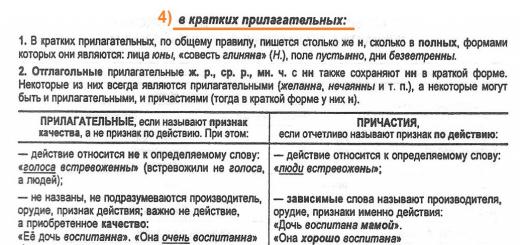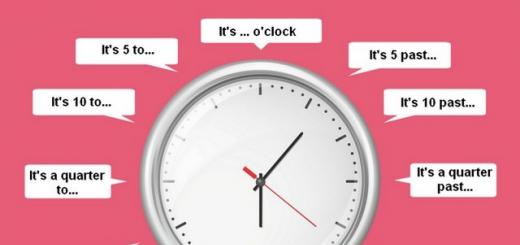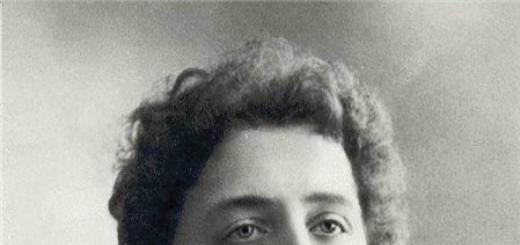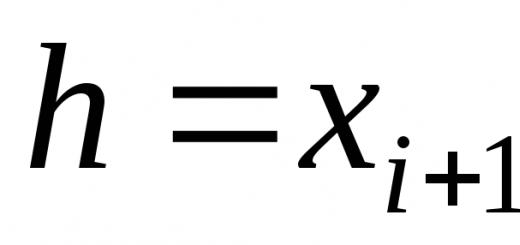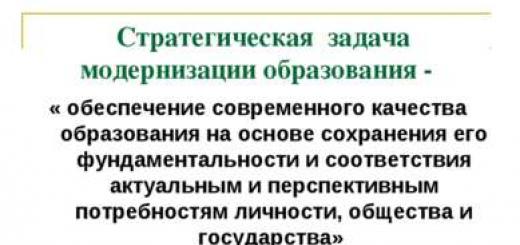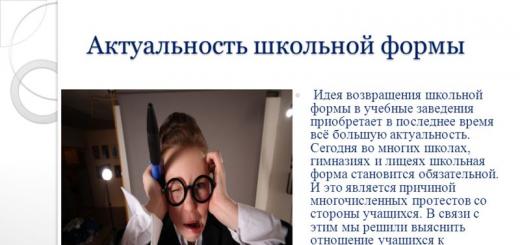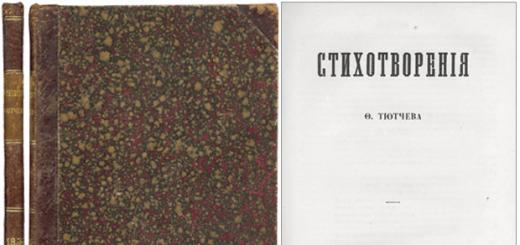In adjectives, one letter N is written in suffixes -IN-, -AN-, -YAN-.
For example: swan(in the suffix -IN - one letter N is written) leather(in the suffix
-AN- one letter N is written) woolen(in the suffix -YANG- one letter N is written).
It is very easy to remember three suffixes in which one letter N is written. Need to know the first letter of the alphabet and the last - A and Z. We add one letter N to them and get suffixes - AN, IN, YAN .
You can learn a rhyme that will help you remember the suffixes of adjectives that are written with one letter N.
For adjectives long ago
Recorded in learned books,
When AN, IN, YAN, then N one
And no more surplus.
Suffix -IN- called “animal”. With the help suffix IN Adjectives are formed from animate nouns denoting animals, insects, birds.
MOUSE IN Y = MOUSE + IN
MOSQUITO IN YY = MOSQUITO + IN
NIGHTINGALE IN YY = NIGHTINGALE + IN
In adjectives MOUSE IN OH,MOSQUITO IN OH, NIGHTINGALE IN YY the “animal” suffix is written - IN - with one letter N.
Suffixes - AN-, -YAN - written in adjectives denoting the material from which the object is made:
SKIN AN SKIN = SKIN + AN
SAND ANІ= SAND + AN
SILVER YANG YY = SILVER + YANG
WOOL YANG OH= WOOL + YANG
GLIN YANG Y = CLAY + YANG
Adjectives SKIN AN OH, SAND AN OH, SILVER YANG YY , WOOL YANG OH GLIN YANGІY are written with one letter Н, since the suffix in them begins with the letters AND I .
You should remember three adjectives whose suffix begins with the letter Y, but the letters N are written in it not one, but two. These are the exception words: TREE YANN OH, TIN YANN OH, GLASS YANN YY.
The following riddle about WINDOW:
glass surface, wooden frame, pewter handle.
2. Two letters НН in adjective suffixes
Two letters N are written in adjectives whose suffixes begin with the letter O or E. For example, EDITORS HE N OH, TRADITION HE N OH, STRAW ENN OH, CRANK ENN YY.
Remember suffix - HE N- helps with NV UN - United Nations.
It is known that suffix - HE N- - UN fan.
It strives to be as similar to the UN as possible in everything. True, the difference between them is immediately noticeable: the suffix - HE N- two letters H, and his UN idol has two letters O.
Using the suffix - HE N -, in which two letters N are written, adjectives are most often formed foreign language origin. For example, COMMISSION HE N OH, EDITORIAL HE N OH, TRADITION HE N OH, REVOLUTION HE N YY
Two letters N are written in the suffix -ENN-.
Adjectives with the suffix - ENN- most often formed from nouns whose stem ends in several consonants: ARTS ENN OH, CRANK ENN OH, LIFE ENN OH, OGN ENN OH, SICK ENN YY.
There is an exception word in the Russian language, the suffix of which begins with the letter E, but the letters N are written in it not two, but one. This word is WINDY.
WINDY DAY
WINDY YOUTH
The word WINDY contains only one letter N!
However, if the prefix WITHOUT appears in the word WINDY, then according to the rule two letters N are written.
WINDLESS NIGHT (the word has a prefix)
Remember the spelling of words WINDY andWINDLESS The following poem helps.
Windy young man, windy day!
You can easily remember:
I always write only one N!
Windless morning, day or night!
Without applying the rules of knowledge,
Write two N without hesitation!
3. Two letters H at the junction of morphemes
Two letters N are written in adjective names formed using the suffix N from nouns with a stem starting with the letter N.
PLAIN = PLAINS N A+ N
LONG= DURATION N A+ N
TRUE= TRUE N A+ N
OUTSTANDING= DIKOVI N A+ N
PANCAKE = BLI N +N
The following poetic rule helps to write the double letter N in an adjective.
Fog one has N,
But if the city became foggy,
Based on N and suffix N,
And it turns out NN,
Remember this case is strange.
4. Something to remember
There are several words in the Russian language that do not have the suffix N and suffer greatly from this. These words are often confused and the double NN is mistakenly written in them.
Remember: in words SINGLE, GREEN, SPICY, RUSH, YOUNG, PORK one letter N is written, which is part of the root.
5. Analyzing examples
Let's determine how many letters N are written in the following adjectives and why.
GUSINY(this word has an “animal” suffix -IN -, in which one letter N is written),
TELEPHONE(this adjective is formed from the noun TELEPHONE, the stem of which ends in the letter N. The suffix N is added. Therefore, we write the word TELEPHONE with two letters N),
STRAW(the suffix of this adjective begins with the letter E, so we write НН),
LINEN(the suffix of this adjective begins with the letter I and denotes the material from which the object is made, so we write one letter N),
WINDY(this is an exception word in which one letter N is written),
INFECTIOUS(the suffix of this adjective begins with the letter O, so we write НН),
GLASS(this is an exception word that is included in the riddle about the window; therefore we write NN).
6. Algorithm for writing N, NN in adjective suffixes
When choosing N, NN for writing in the suffix, you can use the algorithm.
Table 1. Algorithm for writing N, NN in adjective suffixes ()
7. N, NN in short adjectives
It should be remembered that the same number of Ns is written in short adjectives as in full ones: traditional is traditional, smart is smart.
Bibliography
- Russian language. 6th grade / Baranov M.T. and others - M.: Education, 2008.
- Babaytseva V.V., Chesnokova L.D. Russian language. Theory. 5-9 grades - M.: Bustard, 2008.
- Russian language. 6th grade / Ed. MM. Razumovskaya, P.A. Lekanta. - M.: Bustard, 2010.
- ReferenceTable().
- Presentation ().
- Additional exercise ().
Homework
Task No. 1
Insert the missing letters Н or НН where necessary. Justify your answer.
Yu..y, yu..at, silver..y, aviation..y, long..yy, tin..yy, straight..yy, hurricane..yy, debatable..yy, swan..yy, wind..y, windy..oh, windless..yy, axy..yy, morning..yy, morning..ik, glassy..yy, toiler..yy, silver..yy, silver..ka, silverless..ik, family..oh, ice..oh, cranberry..oh, hemp..y, hemp..ik, sparrow..y, nightingale..oh, stirrup..oh, family..oh, Red Banner..y, triumphant..yy, vital..yy, old..yy, guest..aya, guest..itsa, butter..yy, butter..itsa, wind..itsa, va..aya, ple..y, whole..y, drunk..yy, zealous..yy, ruddy..yy, ruddy..yy, fiery..yy, sandy..yy, craft..yy, secondary..yy, retired..y, clay..yy, beastly..yy, offspring..yy, precious..yy, bully..yy, flat-headed..yy, half-dead..yy, wild..yy, not strong..yy, sheep..y, infectious..y, sympathetic..yy, seven-lined..yy, countless..yy, friendly..yy, oaty..yy, simultaneous..yy, ants..yy, car..yy, mouse..y, pig..oh, pig..a, firewood..ik, oil..ik, mal..ik, os..ik, ripple..ik, friend..ik, moshe..ik, windy..ik, side..ik, smart..y, ko..itsa, lee..yy, sandy..ik, travel..ik, vlasya..itsa, vish..ik, weathered..yy, kure..oh (ataman).
Task No. 2
Make the “silent” table speak: write down the necessary words in place of the gaps. Write out adjectives with the studied spelling from the poems.
1. He slept, all shining, in an oak manger,
Like a ray of moonlight in the hollow of a hollow.
They replaced him with a sheep's skin
Donkey lips and nostrils of an ox.
B. Pasternak
2. And the birch tree stands in so... silence,
And snowflakes burn in golden fire.
S. Yesenin
3. Do you love ice...oh January,
No wind, brutal cold.
And I am fierce February,
Blizzard, defiant drifting snow.
Н-НН in adverbs, adjectives and participles, full and short
1. With one letter n are written:
1. Adjectives with a non-derivative base: red, young, blue. There is no suffix in such adjectives. Letter n is part of the root.
2. Denominate adjectives with suffix -n: winter n th(from: winter), years n th(from: summer).
3. Denominate adjectives with suffixes -an, -yan: sandy, silver (adj. meaning “name of material, substance”), and -in: mouse, passerine (adj. meaning “accessories”).
Exception:
wooden, tin, glass write with two letters NN.
4. Verbal adjectives, if there is no prefix and explanatory word: heat fresh meat .
Exception:
Write with two letters NN words from the list:
given, arrogant, abandoned, desired, bought, seen, made, cutesied, captivated, deprived, sacred, read, desperate, minted, cursed, unheard of, unseen, unexpected, unforeseen
Do not confuse:
The list of exceptions does not include words uninvited, uninvited, named, which are consistent with the data above. Write them according to the rule: unsolicited advice, uninvited guest,sworn brother.
5. Short adjectives in the masculine singular form: advice is valuable - (m.r.), as well as short adjectives in all other forms if they are formed from full adjectives with one letter n: red girl (from the full form with one letter n: red), the sun is red, the girls are red.
6. Adverbs on -O And -e formed from adjectives with one letter n: windy, neat.
2. With two letters NN are written:
1. Denominate adjectives with suffix -n, if the root of the noun ends in a letter n:autumn, spring, sleepy.
2. Denominate adjectives with the suffixes -enn, -onn: letter, portion.
Exception:
flighty man, windmill, chicken pox, But windless day,leeward side.
3. Verbal adjectives with suffix -nn : korcheva nn y plot, Brakova nnth thing.
Figure out how the word is formed: defective ← reject + NN .
Suffix -nn write in verbal adjectives formed from a generating stem with suffixes: - Eve//-ova,-Eve: uprooted←uproot, formed←form.
It’s easier to remember this way: adjectives on Eve+nn + th,ova +nn +y, eva +nn+ y.
4. Adjectives-exceptions from clauses:
1.3.Exception: wood, tin, glass write with two letters - NN .
1.4.Exception: the, swaggering, abandoned, desired, bought, seen, made, cutesy, captive, deprived, sacred, read, desperate, embossed, damned, unheard of, unprecedented, inadvertent, unexpected.
5. Passive past participles, if there are prefixes or explanatory words: a written essay, mittens knitted (by whom?) by grandmother, as well as participles and verbal adjectives formed from perfective verbs without prefixes: bought, abandoned, given (the latter are included in the list words to remember in paragraph 5 along with other examples).
6. Short adjectives formed from the full form with two letters NN(except for the form m.r. singular, in which there is always one letter n): night without moon n a, adviсe prices.
7. Adverbs on -O And -e, formed from adjectives with two letters NN: sincerely, thoughtfully, calmly.
So, in order not to make mistakes in the exam, you need to know all the points. Be sure to include examples, because examples are samples that help you act by analogy.
Do not forget about the exceptions in paragraphs: 1.3., 1.4., 2.2.
Attention:
To expand your language experience, you can refer to the section.
This is a constructor dictionary. Set the parameters you are interested in and get the necessary lists of words.
It is now useful for you to turn to the Correct Dictionary, as well as to the Grammar Dictionary. Don’t forget, you can connect the following parameters: “New”, “Easy”, “Difficult”, “Important”. You can add or, on the contrary, exclude words for grades 5-8. Create your own dictionary configuration on the topic tasks 14.
Often provokes many mistakes, although remember the basic rules of spelling single and double n in suffixes it's not that difficult. Let's look at each of them.
Spelling -н- and -нн- in participles and verbal adjectives.
In participles and verbal adjectives -n- is written in the following cases:
- In short participles: the rules are learned, the technique is tested, the field is abandoned.
- When participles or verbal adjectives are formed from unprefixed imperfective verbs: puff pastry, fried meat.
Exceptions!
Seen, unseen, seen, unseen, made (sight), desired, slow, unexpected, unexpected, unheard, unexpected, sacred.
These words need to be remembered.
-nn- is written in participles and verbal adjectives in the following cases:
- If there is a prefix (except non-): baked pie, read a book.
- If the word is formed from an unprefixed perfective verb: deprived. An exception to this rule is "wounded".
- If a dependent word belongs to a participle or verbal adjective: pies baked in the oven.
- If words are formed using suffixes -ovanna-, -yovan-: roared, organized. Exceptions: chewed, pecked, forged.
- If we have an adjective that is formed from a verb with a prefix: desperate, second-hand, shabby, confused, desperate. Exceptions: smart, named (father), dowry (noun), planted (mother).
Spelling -n- and -nn- in adverbs.
In adverbs -n- And -nn- is written in the same cases as in the adjectives from which it is formed:
Tricky - tricky; excited - excitedly.
Spelling -n- and -nn- in adjectives.
In adjectives -n- is written in the following cases:
- If the adjective is formed without a suffix: spicy, young.
- In possessive adjectives that were formed using the suffix -in-: eagle, swan, ant.
- In relative adjectives that were formed using suffixes -an-, -yan-: woolen, leather.Exceptions make up adjectives glass, wood, tin.
- In adjectives oil And windy (BUT! Windless).
-nn- is written in adjectives in the following cases:
- If the stem of the noun from which the adjective is derived ends in -n: foggy+ny.
- If the adjective is formed using suffixes -onn-, -enn-: straw, traditional, station.
- In the above words-exceptions: windless, glass, tin, wood.
Writing one and two letters "N" is the most difficult rule not only for sixth-graders, but also for school graduates preparing to take the Unified State Exam.
This rule combines different parts of speech, and the conditions for writing letters are not at all similar. You need to pay attention to the morphemic composition of the word, and to the way the word is formed, and even to its meaning. And there are just so many exceptions! Therefore, we will learn to choose one or two letters “N”.
Spelling N and NN in different parts of speech
First step.
1. Identify the part of speech.
Let's say it's a noun...
2. Determine where the root of the word ends.
We write NN,
- if the root of the word ends in N, and the suffix begins with N: malin-Nik, druzhN-Nik, swindler-Nik (but: hard worker!);
If the noun is formed from an adjective that has NN, or from a participle: fogNN-ost (foggy), izbalovaNN-ost (spoiled).
- if the noun is formed from an adjective that has N (including in words with exceptions): maslEN-itsa (buttery), gostin-itsa (gostiny), konoplyan-ik (hemp), Varen-ik (boiled), wind-ik (windy), smart (smart);
If the noun is formed from differently inflected nouns (in MY: name, tribe, seed, etc.): nominal, tribal, seed;
Exception words deer, pork, ram, carp, seal, etc. are written with one H, since they are formed from nouns with a stem in N (root: deer, pig, ram, carp, seal, etc.).
More exceptions to the rule: young, crimson, spicy, red, ruddy, blue, green, dowry.
Step two.
Let's say it's an adjective...
formed from the name of a noun or adjective, then it is called nominal or denominate and is very different from the adjective that is formed from an imperfective verb.
We write NN,
- if formed using the suffixes ENN, ONN: triumph - solemn, revolution - revolutionary, healthy - healthy;
Exceptions to the rule: windy (but: windless!).
If the root of the word ends in N: son - sleepy, desert - deserted, vechNa - ham.
And now about when N is written:
- if the adjective is formed from nouns using the suffixes AN, YAN, IN: leather - leather, silver - silver, ant - ant;
Exceptions to the rule: GLASS, TIN, WOODEN.
If the adjective depends on the lexical meaning:
with the wind (windy weather, but a windy girl),
driven by the force of the wind (wind engine, pump, windmill), but spreads quickly like the wind (chicken pox);
smeared, soaked or stained with oil (oiled pancake, oily week, oily eyes, oily voice, oily bottle);
acting with the help of oil, diluted in oil, intended for oil (butter cookies, oil paint, oil engine, oil bottle);
subjected to silvering, coated with silver (silver spoon);
made of silver (silver bowl);
Let's say it's an adjective...
formed from an imperfective verb.
Then N is always written in it: mad (enrage) dog, boiled (boil) potatoes, sauerkraut (ferment) cabbage, boiled (boil) water, smoked (smoke) fish, etc.
Exceptions to the rule: made (view), desired, slow, unprecedented, unforeseen, unsleeping (eye), unexpected, unheard, accidental, sacred, affected, arrogant, minted.
The adjectives valYANY (from valYat’) and valENY (from valIt’) differ in the spelling of the vowel before N, since the suffixes of the indefinite form of the verbs from which they are formed are different.
Adjectives with the prefix NOT, formed from imperfective verbs, are written with one H, since NOT, attached to a verb, does not change its appearance: unbleached ceiling, quicklime, untraveled road, unbaptized child, unpaved street.
In complex adjectives such as ironed-re-ironed, broken-broken, washed-rewashed, darned-redarned, it is recommended to write one H in the second part, since the prefix PERE does not form a new word (participle), but only indicates a high degree of quality, called a complex adjective .
Complex adjectives such as smooth-painted, hot-rolled, gold-woven, gold-forged, little-trodden, little-trodden, finely crushed are written with one H; they are formed from a combination of adverbs (smooth, hot, little, a lot, etc.) and verbal adjectives with H: smooth + painted.
BUT: if an adverb word is combined with an adjective formed from a prefixed verb, the complex adjective is written NN: smoothly painted (smoothly + painted), freshly frozen, freshly cut.
Exceptions to the rule: sworn brother, imprisoned father, smart child.
Step three.
LET'S CONVERT VERBAL ADJECTIVES INTO PARTICIPLES!!!
We write NN,
- if there is OVANNY or YOVANNY (that is, they have the suffixes OVA-EVA): pampered, pickled, organized;
exceptions to the rule: chewed, pecking, forged, in which the combinations OB, EB are part of the root and only the suffix N is added to the stem of the verb;
in prefix formations NN is also written: savvy, unchained, pecked, chewed;
If there is a prefix, except NOT (unpainted floor, overcooked fish, gilded bracelet);
If there are dependent words (painted floor, fried fish in oil, mowed meadow).
Step four.
Let's say this is a passive participle...
It is always formed from a perfect verb. That is, it always has the prefix: fenced, resold, trampled!
If it is COMPLETE, ALWAYS write NN!
The participle can also be formed from an unprefixed verb: buy - bought, throw - abandoned.
The suffixes OVA-EVA are often found in the participle, and then we also write NN!
The spelling of participles differs from the prefix formations of the verbs weigh - hang, knead - interfere, roll - swing.
From verbs ending in EAT, IT, the participle requires the suffix ENN (hung, hung, hung, hung).
For verbs ending in AT, YAT, the participle requires the suffix НН.
You should keep in mind the lexical meaning of the words:
curtain - close with a curtain (A tightly curtained window did not let in any light);
hang - hang, put on something (hung door);
hang - hang throughout the entire space (All the walls were hung with bunches of herbs);
hang - hang in large quantities (Various posters were hung in the corridors);
hang - hang on all sides, hang everywhere (Ships hung with multi-colored flags look festive);
hang - hang in different places (In summer, well-hanged laundry dries quickly).
In the stable combination Shot sparrow, the adjective is written with one N.
If the participle is SHORT, then write N!
Problem solved, floors painted.
Can I pose questions to whom? than?, to clearly prove that this is a short participle and not a short adjective.
The area around the new house has not yet been landscaped by the residents (participle).
The area around the new house was small and poorly maintained (adjective).
The girl was musical and well-read (adjective).
The population was excited by the message on the radio (communion).
Mommy is excited today (adjective).
The sea is agitated by the wind today (participle).
If the sentence contains adverbs formed from an adjective or participle, ask them questions from the verb: She walked around the room excitedly (how? walked - excitedly). As a rule, as many N are written in adverbs as in the word from which it is formed.
Now you can move on to practice!
Spelling: Spelling -Н- and -НН- in various parts of speech (nouns, adjectives, participles, adverbs).
1. Two letters H written: 1) in adjectives formed using the suffix -n- from nouns with a stem on n(sleep - sleepy); 2) in adjectives formed from nouns using suffixes -onn-, -enn-(station). Exception: windy.
2. One letter N written: 1) in the suffix -in-(goose); 2) in the suffix -an- (-yang-) adjectives formed from nouns (leather). Exceptions: tin, wood, glass.
3. B short adjectives the same number of letters is written n, so much in full. Tumanna (foggy).
4. Two letters N are written in suffixes of full participles and adjectives formed from verbs: 1) if they contain a prefix, except Not-; 2) if they include dependent words; 3) if the word has a suffix -ova-(-Eve-); 4) if the word is formed from an unprefixed perfective verb, except wounded. Dried, galvanized, stripped (from deprived - verb. Sov. v.), measured with a ruler
5. One letter N written in suffixes: 1) short passive participles; 2) prefixless adjectives formed from imperfective verbs, and also without a dependent word (confused answer). Exceptions; slow, desired, sacred, unexpected, unseen, unheard, unexpected.
6. In adverbs on -O (-e) is written the same amount n, how many are in the adjectives from which they are derived. Ordinary (ordinary).
Table “Spelling -Н- and -НН- in various parts of speech”

Lesson summary “Spelling -Н- and -НН- in various parts of speech.”

